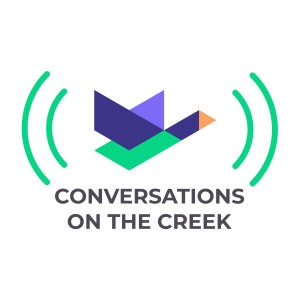

Episode List

Solana, 24/7 Trading, & Internet Capital Markets with Hadley Stern, Marinade Finance
What happens when traditional finance collides with decentralized networks? Hadley Stern, Chief Commercial Officer at Marinade Finance, takes us on a fascinating journey from his 18-year career at Fidelity Investments to the cutting edge of decentralized finance. Drawing from his pioneering experience leading Bitcoin initiatives as early as 2014, Hadley provides unique insights into why decentralized networks represent the future of global finance.The conversation explores the revolutionary convergence of traditional finance with blockchain technology. As tokenized equities begin trading on Solana through platforms like Superstate, we're witnessing a fundamental shift in market accessibility. Unlike previous attempts that merely tracked prices, these new offerings provide actual ownership with voting rights while enabling 24/7 global trading – a stark contrast to traditional exchanges' limited hours.Hadley articulates why this matters: "It comes back to this ethos of decentralization and the idea that networks, tools, software, things that we do every day that are currently handled by centralized entities can actually be handled by decentralized entities, and that's better for the world."The total addressable market for "internet capital markets" is staggering – potentially many trillions of dollars. With Solana processing more transaction volume than all other blockchains combined, Marinade Finance is strategically positioned at the center of this revolution as a staking provider for institutional players entering the space.The discussion also touches on fascinating technological parallels, including how AI and "vibe coding" are enabling developers to build applications that reach $100 million in revenue within months – a pace unimaginable even during the early internet boom.Whether you're an investor, builder, or simply curious about where finance is heading, this episode provides an illuminating roadmap to the future of capital markets. Subscribe to The Index Podcast for more conversations with visionaries shaping the next generation of technology and finance.Learn more at https://marinade.finance/Show LinksThe Index X ChannelYouTube

DoubleZero: Building a Faster, Safer & Censorship-Proof Internet with Austin Federa
What if blockchain networks could process transactions hundreds of times faster than they do today? This fundamental question led Austin Federa to leave his position at the Solana Foundation and co-found Double Zero, a revolutionary project building what might be the future of the internet itself.Austin reveals the surprising limitations of our current internet infrastructure that most people never consider. While engineers at Solana had built validator clients theoretically capable of processing a million transactions per second, the public internet simply couldn't support those speeds. Even more concerning, the entire internet is controlled by approximately 20 tier-one ISPs worldwide, creating both performance bottlenecks and potential censorship vulnerabilities.Double Zero's solution is breathtakingly ambitious yet practical: create a parallel infrastructure using dedicated fiber connections that enable direct routing between nodes. By September 2023, they had connected 50 different fiber links across 18 global locations, offering 20-100 times the bandwidth capacity of typical blockchain nodes. What makes this approach unique is the consortium model, bringing together 11 different companies to contribute existing fiber to the network rather than attempting to build this massive infrastructure alone.The economic innovations are equally fascinating. Austin explains "proof of utility," their novel reward system based on Shapley values that measures actual contribution to network performance. Unlike traditional cryptocurrency models, if you operate a fiber link that nobody uses, you earn nothing. This creates fierce competition to provide the fastest, most reliable connections.Perhaps most intriguing is Double Zero's long-term vision: eventually eliminating IP addresses entirely in favor of cryptographic routing. This would remove centralized intermediaries like certificate authorities and DNS servers, creating a more secure and truly decentralized internet infrastructure resistant to spoofing and man-in-the-middle attacks.As traditional finance increasingly explores blockchain solutions, the demand for high-performance networks will only grow. Double Zero isn't just improving existing technology—it's rebuilding the internet from the ground up. Listen now to understand how this revolution might transform our digital infrastructure forever.Show LinksThe Index X ChannelYouTube

DATs and Building the Preeminent Solana Treasury | Cosmo Jiang, General Partner at Pantera Capital
What happens when one of crypto’s most prestigious investment firms decides to go all-in on Solana?In this episode of The Index Podcast, host Alex Kehaya sits down with Cosmo Jiang, General Partner at Pantera Capital, to unpack their groundbreaking move into the Digital Asset Treasury (DAT) space with HSDT Helios—a $500 million Solana-focused venture already making waves across the industry.Why Solana over other blockchains? Cosmo shares a refreshingly straightforward thesis, drawing on Jeff Bezos’ “holy trinity” of consumer wants: faster, cheaper, and more accessible. It’s this simple yet powerful framework that explains how Solana surged from generating $50,000 in revenue in 2020 to $1.4 billion in 2024—a growth curve impossible to ignore.Together, Alex and Cosmo dive deep into what makes Digital Asset Treasury companies work, why Solana-based DATs hold fundamental advantages over Bitcoin alternatives, and how these entities function more like sophisticated financial institutions. “These businesses look a lot like banks,” Cosmo explains. “If they can generate a return above their cost of capital, then they trade above book value.” It’s a lens that helps founders and investors alike understand why premier DATs command sustainable premiums.For founders and crypto investors, this conversation is a master class on the rapidly expanding $80B DAT landscape, from evaluating which companies might outperform to exploring how regulatory tailwinds are opening new possibilities for tokenized equity in DeFi.Want to understand the future of institutional crypto adoption and how Solana is positioning itself at the center of this revolution? This episode is your essential guide.🔗 Learn more at Helius ➡️ ✨Solana Company✨ - https://www.solanacompany.co/Show LinksThe Index X ChannelYouTube

Optimism’s Superchain, DeFi Mullets, and Scaling Ethereum | Sam McIngvale, Head of Product at OP Labs
What does the future of Ethereum and blockchain really look like — a few massive chains, or thousands of specialized ones working together? This week, host Alex Kehaya sits down with Sam McIngvale, Head of Product at OP Labs, to explore the evolution of Optimism from an Ethereum scaling solution into the creator of an entire ecosystem powered by the OP Stack.Sam breaks down the idea of the “Superchain” and many others share both technology and revenue. It’s a model that combines customization with the security of shared, battle-tested infrastructure, creating a powerful network effect.You’ll also hear his take on enterprise adoption and the rise of what he cleverly calls “DeFi Mullets” — familiar, traditional-looking financial products with decentralized rails underneath. Sam explains why users often trust brands like Coinbase over abstract decentralization, while still stressing the need for “escape hatches” to protect blockchain’s core values.For builders in web3, this conversation offers a compelling vision: how institutions managing trillions could drive the next wave of adoption, and how enterprise solutions, better infrastructure, and interoperability are shaping that path.Ready to explore how open-source infrastructure is reshaping Ethereum and the broader blockchain landscape? Tune in and discover why the future may belong to those building bridges rather than walls between ecosystems.🔗 oplabs.coShow LinksThe Index X ChannelYouTube

Open Source, Cross-Chain Security & ZK Proofs | Marc Boiron, CEO of Polygon Labs
The blockchain world is undergoing a fundamental shift. What once seemed possible—scaling Web3 to internet size with a single chain—is now recognized as unrealistic. The future belongs to specialized chains that excel at specific tasks while seamlessly communicating with one another.This week on The Index, host Alex Kehaya sits down with Mark Boiron, CEO of Polygon Labs, to discuss the next chapter in open source development and explore how the Aggregation Layer is unlocking a new era of blockchain interoperability. Unlike traditional bridges that rely on wrapped assets, the Aggregation Layer leverages zero-knowledge proofs to verify chain states and enable secure cross-chain transactions—solving critical issues with settlement control and reorganization risks that have long plagued current solutions.Boiron also unpacks the rapid evolution of zero-knowledge development. What experts once predicted would take 5–10 years has already been achieved in just two, hinting at an even greater wave of breakthroughs to come—both within and beyond blockchain.Rather than framing chains as competitors, Boiron envisions an ecosystem of collaboration, where specialized networks focus on their strengths—whether payments, gaming, or DeFi—while remaining interconnected. Even chains often seen as rivals, like Solana, could eventually integrate into this unified experience as demand for cross-chain assets grows.Ready to rethink blockchain scaling and interoperability? Tune in now to discover why the next era of Web3 won’t be about competition between chains, but collaboration across them.Website: https://polygon.technology/Show LinksThe Index X ChannelYouTube
Create Your Podcast In Minutes
- Full-featured podcast site
- Unlimited storage and bandwidth
- Comprehensive podcast stats
- Distribute to Apple Podcasts, Spotify, and more
- Make money with your podcast












